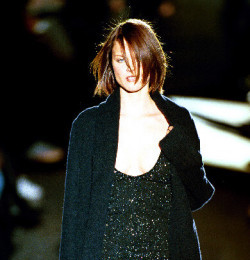

Ellen Tracy
New York, NY 10018
USA
About
founded by
Herbert Gallen
belongs to
Liz Claiborne, Inc
about
Ellen Tracy, Inc., which originally made blouses, is now a leading maker of bridge apparel--clothing that falls in between high-price designer lines and lower-priced labels. Located on Manhattan's Seventh Avenue, Ellen Tracy is especially adept at producing quality garments suitable for the professional woman, workhorse items that complement a wardrobe for many years despite changing styles. Its Company Ellen Tracy label produces casual clothing aimed at a younger market. In addition, Ellen Tracy has licensed agreements for shoes, hosiery, belts, eyewear, and a home collection.
The company was acquired in 2002 by Liz Claiborne, Inc. and became a wholly owned subsidiary of that company.
Herbert Gallen established Ellen Tracy in 1949.
In 1979 Ellen Tracy moved beyond junior sportswear, becoming involved in the designer-sportswear category. In 1983 the company added a petite division, and a year later, with designer names becoming an important aspect of marketing apparel, Allard's name was added to the Ellen Tracy label. It was also around this time that the bridge category began to emerge in the fashion industry and Ellen Tracy found a natural niche within it. The company added a dress division in 1985, then in 1986 made its first attempt at licensing the Ellen Tracy name, a deal for scarves with Collection XIIX Ltd. As would be the case with subsequent licensing arrangements, Allard provided a major influence over accessories bearing the Ellen Tracy name, making sure they complemented the apparel and exercising final approval. During this period the label was supported by advertising campaigns that in 1983 featured model Carol Alt and in 1987 a young Cindy Crawford.
With its core customer growing older, Ellen Tracy in 1991 launched a new line, Company Ellen Tracy, to appeal to a younger market and offer casual weekend attire rather than more formal, business clothing.
Success of Company also led to the addition of plus sizes in spring 1993. In 1992 Ellen Tracy made an attempt to enter the fragrance business, signing a licensing agreement with Revlon. Despite being accepted by customers, the perfume was soon discontinued when Revlon elected to focus on the mass market and eliminated prestige product lines. Ellen Tracy grew internally at a steady pace, yet Gallen never showed any interest in acquisitions. The label was also very much a domestic business, with attempts to penetrate the European markets never successful. Nonetheless, Ellen Tracy topped $200 million in annual revenues during the 1990s. It was a solid performer in stores, had a loyal customer base, and attracted a number of suitors who believed that the company held tremendous promise.
In 1995 rumors circulated that Ellen Tracy would soon be sold and by October a deal was signed, with Boston-based investment firm, Bain Capital Group, agreeing to pay an undisclosed amount. As part of the transaction, executive Jay Margolis was to be brought in as chief operating officer with the expectation of ultimately replacing Gallen. Margolis was well respected in the fashion industry, having previously served as vice-chairman of Liz Claiborne as well as vice-chairman and president of Tommy Hilfiger. Gallen told the press, however, that Margolis would have to prove himself before taking over. Several weeks later Margolis opted to become chairman and CEO of Esprit de Corp, a struggling junior sportswear company. The sale of Ellen Tracy to Bain Capital was subsequently called off, although both parties maintained that Margolis's change of heart played no role in the decision, instead calling it a "mutual decision."
Gallen and Allard continued to run Ellen Tracy, with the elderly majority owner showing no signs of relinquishing power. In 1996 the company awarded a three-year license for footwear to Intershoe Inc. for both of its major lines. Later in the year the company also signed a licensing agreement with Roma, a Norman M. Morris Corp. division, to produce belts under the Ellen Tracy labels. It took another stab at fragrances in 1998, licensing the Ellen Tracy label to Cosmopolitan Cosmetics, a well-respected company that also made and marketed cosmetics and fragrances for such major names as Gucci, Rochas, Anna Sui, and Charles Jourdan. When the fragrance premiered in March 2000 it was an immediate hit with consumers, prompting the launch of ancillary products.
Also in 1998 Ellen Tracy signed licensing deals for eyewear with Viva International Group and outerwear with Listeff Fashions. All told, 1998 proved to be a highly successful year for Ellen Tracy, due in large part to the introduction of the Ellen Tracy Club, which rewarded customers for paying full price for its garments: members received a $100 gift certificate toward regular-priced apparel for every $1,000 spent. In this way, Ellen Tracy was able to overcome the bridge category's habit of attracting customers through markdowns, as well as build brand loyalty. A newsletter sent to some 20,000 club members also reinforced the bond with customers, sharing developments at Ellen Tracy as well as giving out such prizes as free New York shopping trips.
A more significant change took place in September 2002 when Gallen finally sold the business to Liz Claiborne for $170 million in cash and the assumption of $10 million in debt, a move that not only allowed him to plan his estate but also ensure that Ellen Tracy would outlive him. Moreover, Claiborne had the financial resources to take Ellen Tracy to another level. Gallen stayed on as chairman and continued to exert a major influence on the business, while Allard retained her position as Design Director.
Brought in as president to provide day-to-day management of the subsidiary was Glenn McMahon, former president of Kenneth Cole women's sportswear at Liz Claiborne, which now boasted some two dozen brands and annual revenues of nearly $3.5 billion. With the backing of its corporate parent, Ellen Tracy was poised for significant growth, with plans for more licensing agreements (jewelry and handbags being likely candidates), international expansion, and the possible opening of Ellen Tracy specialty stores in key markets.
The Look
Elegant, sophisticated looks to take you from the desk to dinner. Ellen Tracy initiated the concept of the total wardrobe for the working woman.
Ellen Tracy makes elegant sensible clothes for women, nothing radical or shocking.
They realize that 90% of women do not have supermodel bodies and they focus on the customer, not temporary fashion trends.
Who Wears It
Those with tailored tastes who have to multi-task, like women who work and travel, or who also have kids in addition to a glam career, like Cindy Crawford and Stephanie Seymour.
Perfumes
Official Social Media
Latest Ellen Tracy Advertisements



Ellen Tracy Fashion Shows


